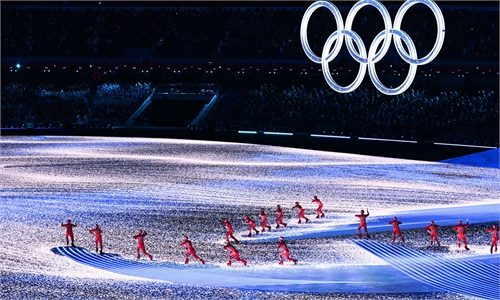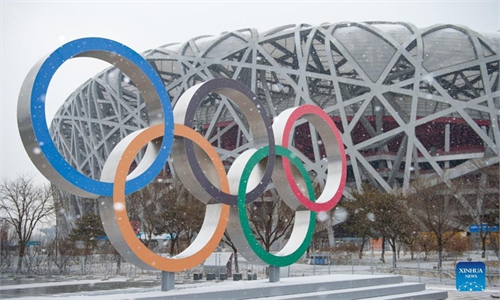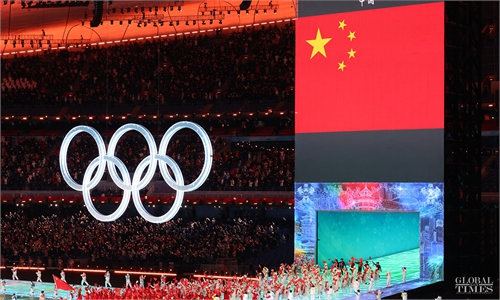China’s progress between two Olympics impresses world
Cultural confidence grows with rising strength, global status
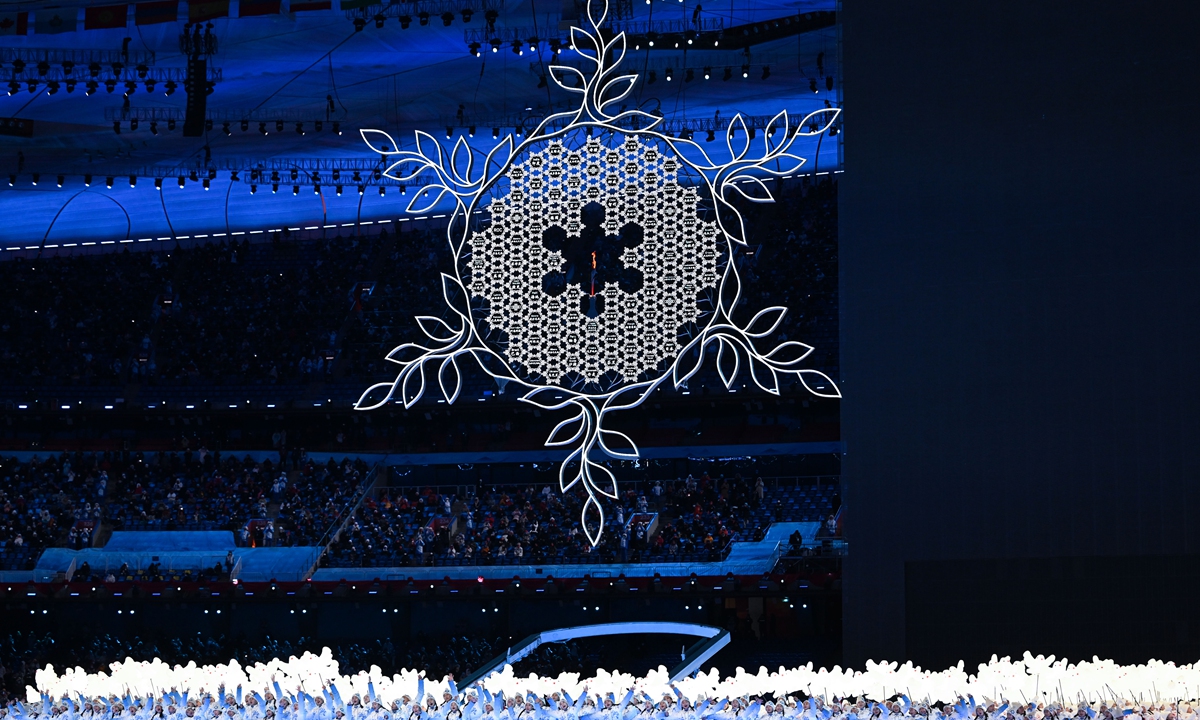
Photo:Xinhua
At 8 pm on Friday, Beijing officially became the world's first and only "dual Olympic city" as the global spotlight fell on the opening ceremony of the Beijing 2022 Winter Olympic Games.From past to present, the ceremony has become a window to observe how China has changed from telling the world "who I am" to "where we are heading."
Looking back at the 2008 Olympic Games, China and the Olympics have made each other better. On Friday, another impressive opening ceremony played the first note of China's second journey of influencing the world through this globally enjoyed sporting event.
Compared with the grand opening ceremony in 2008, the streamlined opening ceremony in 2022 looked more relaxed but once again, it won global praise.
Experts and observers told the Global Times that the two Olympic Games, 14 years apart, have documented the legacy the Olympics have left for Beijing. And the cultural confidence embodied in the opening ceremony is proof that China's national strength and status have become completely different. As Chinese President Xi Jinping pointed out during his inspection of Winter Olympics preparation on January 7, "History will engrave this stroke."
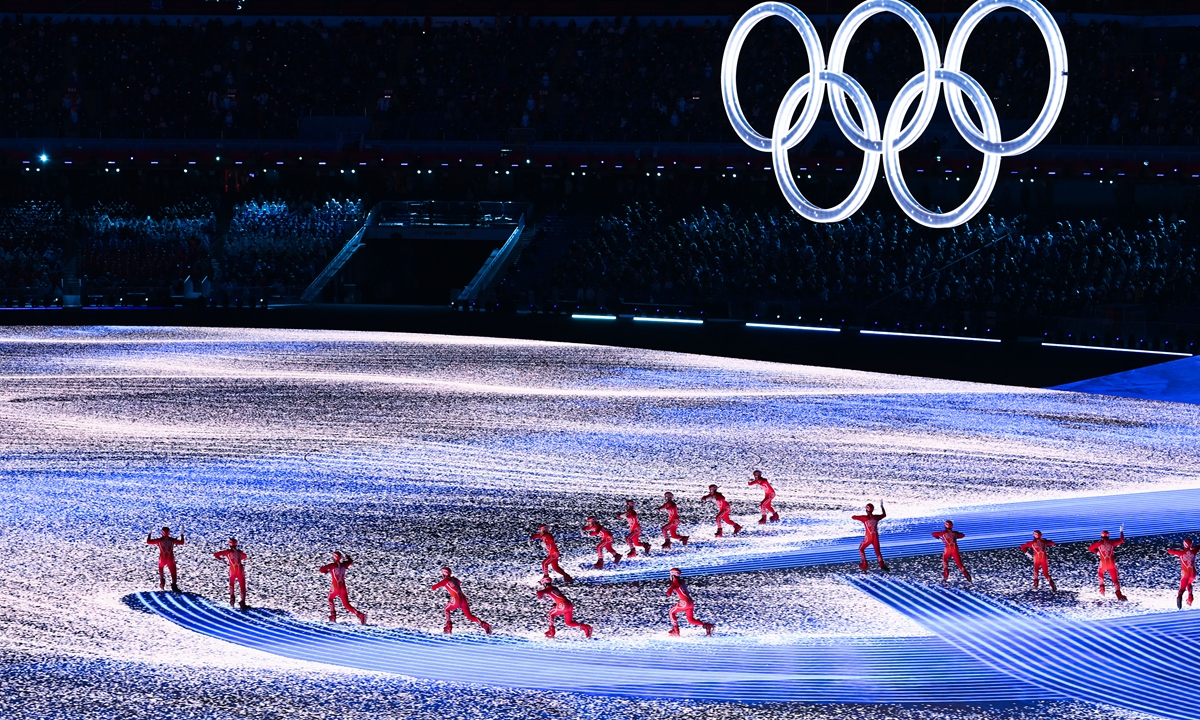
Photo:Xinhua
A more confident ChinaCompared with the "sea of people" seen during the 2008 Games opening ceremony, which featured 15,000 performers and lasted four hours, Friday's ceremony was much more streamlined, cutting down to 3,000 actors and about two hours.
Observers noted that although China joined the WTO in 2001, in2008 many Western people still had the impression that China was poor and backward and they held prejudices against China. That's why the opening ceremony of the 2008 Games introduced the world to China's passion, hospitality, affluence and peace in a way that had never been seen before.
On Friday, celebrated Chinese filmmaker Zhang Yimou, who was chief director for the opening ceremonies of both Games, merged the concept of Chinese aesthetics and the presentation of the latest technological achievements such as artificial intelligence, machine vision and 5G into an amazing show that intertwined the tradition and the future in one moment.
The shorter but splendid opening ceremony also won the world's praise - UK-based newspaper The Guardian even noted the opening ceremony could be "the greatest show on earth."
"Host countries use opening ceremonies to present themselves to the world. Often they emphasize their own history and achievements. That hasn't been the case this time. China's theme - 'One World, One Family' - and its decision to showcase 'ordinary citizens' from different ethnic minorities, all existing happily together," wrote New York Times reporter Sarah Lyall on Friday.
China no longer needs to prove to the world "who I am." .
Fourteen years after the 2008 Games, the 2022 opening ceremony directed once again by Zhang appeared to be much more relaxed, as it did not try to show the country's history from the past to the present but rather tell a story about solidarity and a shared future using dazzling technologies and eco-friendly concepts, underscoring "where we are now" and "where we are heading."
In Zhang's view, the core of the opening ceremony has been upgraded from "I" to "WE."
The 2008 ceremony focused more on introducing more people to traditional Chinese culture, while the 2022 ceremony is about the spirit and philosophy shared by all mankind and the great theme of building a community with a shared future for mankind, Zhang said.
The change reflects the cultural confidence China has gained, he said.
"To be able to reflect a romantic sentiment in a large opening ceremony is actually the best expression of cultural confidence," he said. "Only when you are confident can you present a natural, relaxed, happy state, without pressure."
"Today is very different from 2008," Zhang said.
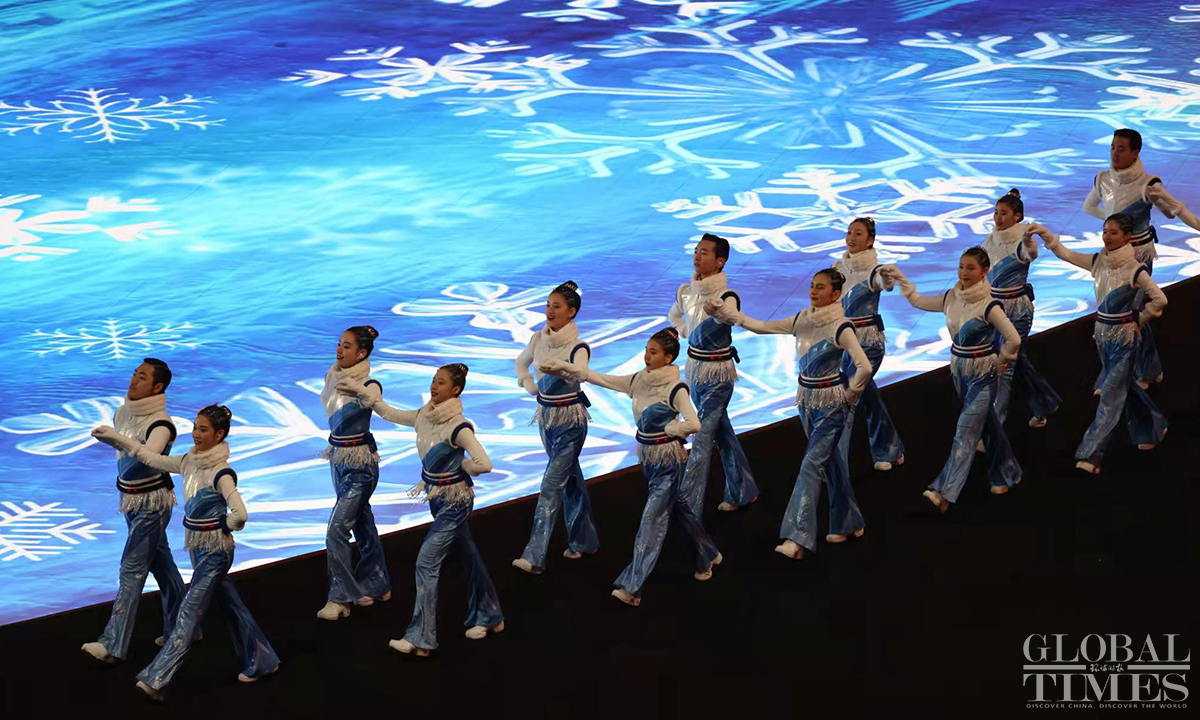
Photo: Li Hao/GT
First dual Olympic city
Becoming the world's first and only city to host both the Summer and Winter editions of the Olympic Games, Beijing has demonstrated a lot of passion and competence when it comes to the Games, Juan Antonio Samaranch, chairman of the IOC Coordination Commission for Beijing 2022, told the Global Times.
The Summer Games in 2008 did change the level and awareness of Chinese sports around the world by increasing the country's competitiveness in many disciplines. China is now one of the top countries in multi-sport events, he said.
"We see a lot of very positive elements that come from the fact that Beijing is not a first-time organizer," Pierre Ducrey, the IOC Olympic Games operations director, told the Global Times in a recent interview.
Ducrey pointed out that Beijing is using a number of the venues in the city, which is a fantastic legacy for all of ice sports.
The National Stadium, better known as the Bird's Nest, has remained to house another brilliant opening ceremony, demonstrating China's evolution to the world.
The National Aquatics Center, once known as the "Water Cube," has been turned into the "Ice Cube" and is now the Olympic competition venue for curling. Yet, nostalgic Chinese decided not to erase its memory from 2008 by retaining its ability to function as a swimming pool. The reconstruction team made the center the first arena that can switch "between water and ice."
"Some volunteers who served during Beijing 2008 are now working for Beijing 2022, which has also attracted hundreds and thousands of students to join as Games-time volunteers and city volunteers," Ducrey said.
Ding Bocheng, a member of the organizing committees of both the 2008 Games and the 2022 Games, also noted that the volunteer spirit is a most important legacy that the Olympics has brought to the capital city.
"In 2008, volunteers were selected from campuses, communities and enterprises. The participation rate is very high," Ding noted, pointing out that this spirit has stayed with Beijing residents ever since.
After the 2008 Games, Beijingers' enthusiasm improved the capital city's image on the world stage, he said.
The 2008 Olympics constitute the moment when China took a prominent place on the world stage, showing off the rising prosperity of its people and the glories of its ancient civilization, said Ken Hammond, professor of East Asian and global history at New Mexico State University.
"The Games was a marker of China's reemergence as a major participant in international affairs," he said.
Over the past 14 years, Beijing has blossomed in many ways. In terms of public transportation, the 2008 Summer Games prompted a subway construction boom and the capital city had 200 kilometers of subway in operation. By 2021, the metropolis boasts an underground network of 780 kilometers in total, one of the largest in the world. Beijing's GDP per capita rose from $9,075 in 2008 to $28,500 in 2021.
Beijing's status as the world's first "dual Olympic city" is another source of national pride that fully demonstrates the city's and the country's capabilities, Kenneth Fok (Fok Kai-kong), vice president of the Sports Federation and Olympic Committee of Hong Kong, told the Global Times.
The fundamental reason why Beijing can become the world's only "dual Olympic city" comes down to China's strong government and rapid economic development, Ding told the Global Times.
Beijing has also undergone tremendous changes, witnessed by the two Olympics.
During the Summer Games in 2008, the most common task for volunteers was to clean up "illegal ads," also known as "city psoriasis," which could be seen on walls, piers and utility poles in the city at the time, Tao Zhenguo, a volunteer for Beijing's "dual Olympics," told the Global Times.
"We each had to take a small watering can and a shovel to clean them up every day, otherwise the city would have been disfigured by them," Tao said.
Now, however, the face of the city has been completely renewed, and such ads are rarely seen in Beijing.
Still, many things remain in the city, silently carrying on its memory and spirit as an Olympic legacy.
The people of Beijing are celebrating the 2022 Winter Olympics as enthusiastically as they did in 2008, and the opening ceremony of the Beijing Winter Olympics impressed the world as much as the Summer Games opening ceremony did 14 years ago.
The Winter Olympics mark a new beginning for China to reshape its image through the Olympics and not simply repeat and recreate 2008, observers noted.
The Beijing Winter Olympics will be the 'opening ceremony' for China's advancement to a developed country, Hong Kong-based newspaper Ming Pao said Friday.
From 2008 to 2022, China has been facing an ever changing world with growing challenges amid the US-led geopolitical wrestling. No matter how much effort China has made in showcasing a true, sincere and committed nation to the world through the Olympics, there have been hostile voices inside the US-led Western block in defying and slandering the image of China, instigating rejection of such a grand occasion of unity by citing so-called human rights or a "diplomatic boycott," which only reflects the narrow-minded thinking of the West.
Over the past 14 years, China has continued to prosper. Meanwhile, its capabilities of handling the complex situations, both internal and external, have being further enhanced, which boosted public confidence in not only the cultural sphere, but also national identity and its own path of development.
Back in 2008, the stunning pyrotechnics show of the opening ceremony made a statement: China has arrived.
In 2022, China no longer needs to prove its standing on the world stage; instead, it wants to proclaim a sweeping vision of a more prosperous, more confident nation, said the New York Times in a recent article. "Regardless of how many medals its Olympians garner, China is already ahead on the leader board."
